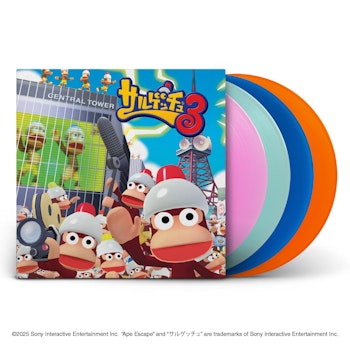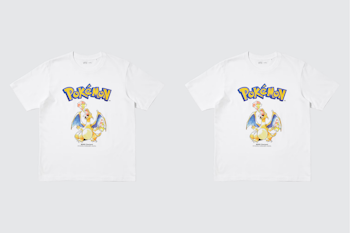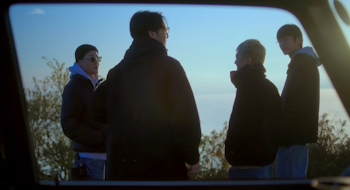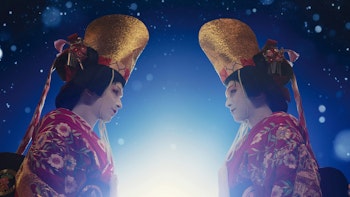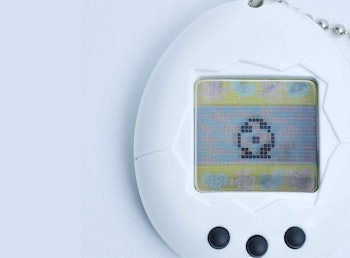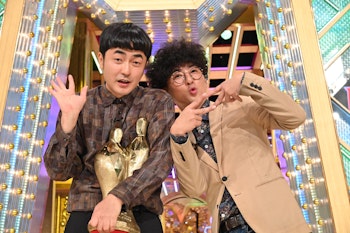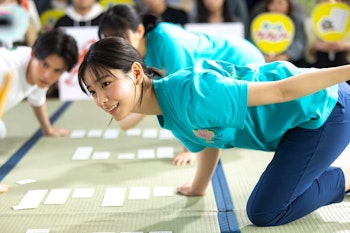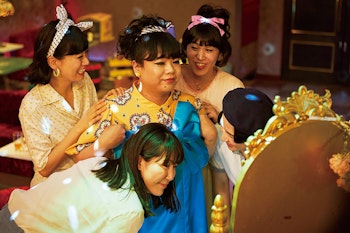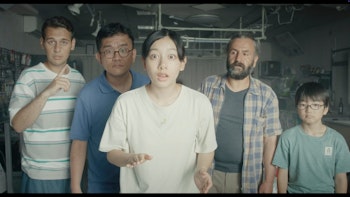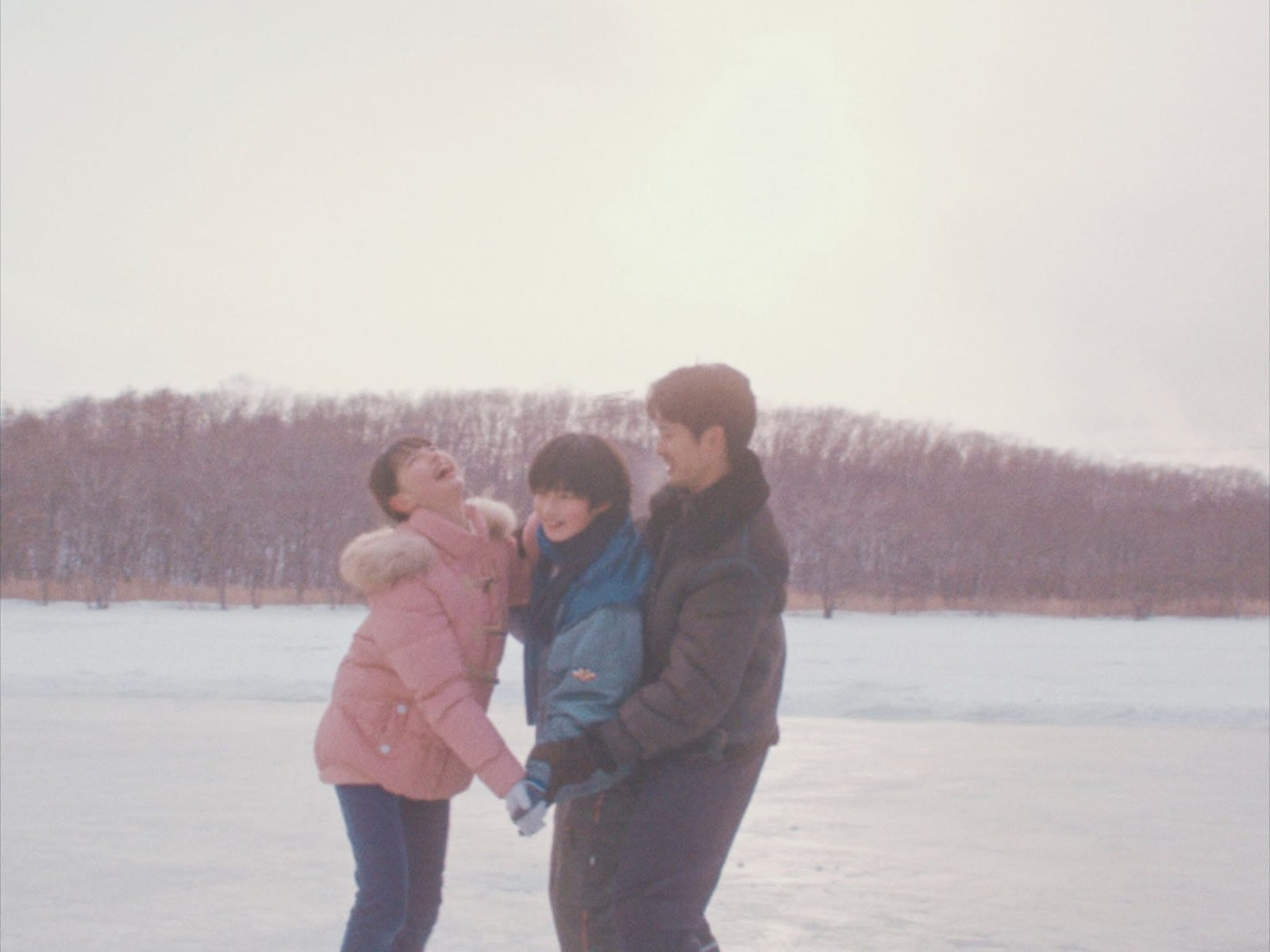
In the poem from which Claude Debussy’s famous "Clair de lune" takes its name, moonlight inspired poet Paul Verlaine to circle upon the true meaning of the soul, an essence of life that’s ambiguous yet glistens in ways words can never fully express. Debussy’s music transforms this idea into an impressionist painting, lacking a security of place and constantly in flux yet somehow capturing the flickering embers of love and life in all its joy and pain through a single, beautiful movement.
Hiroshi Okuyama’s My Sunshine uses this song as a prominent motif throughout, pairing the blooming taps of the piano with the silent glances and moments shared by two young ice skaters and their mentor in a relationship that blossoms and melts away with the snowfall in hauntingly-beautiful filmic prose.
The first snow of the year falling on a rural town in Hokkaido marks the start of winter, and the replacement of baseball gloves with ice skates. Takuya (Keitatsu Koshiyama) was never good at baseball, and he isn’t much better at ice hockey, either. Yet witnessing Sakura’s graceful figure (Kiara Nakanishi) pirouetting across the ice leaves him infatuated, encouraging him to copy her lead. This in turn captures the attention of former male ice skating champion Arakawa (Sosuke Ikematsu, Kamen Rider, The Story of Yonosuke), who takes him under his wing. He even lends him proper skates rather than the rugged pair he used before, and eventually brings Sakura and Takuya together to form a skating duo for an upcoming competition.
Even before Hiroshi Okuyama’s My Sunshine made its debut in Japanese theaters earlier this month, Okuyama was being uplifted by the Japanese film industry as one of the most exciting new voices working today. His debut film, Jesus, earned the director a Best New Director prize at the San Sebastián International Film Festival at the early age of 20, and he was one of three directors took under the wing of Kore-eda Hirokazu to direct and write individual episodes of the director’s Netflix series The Makanai: Cooking for the Maiko House. This film also made Okuyama the youngest Japanese director ever to appear at the prestigious Cannes film festival. Yet My Sunshine is most notable for its refusal to abide by the conventions one would expect from Japanese slice-of-life cinema, both in terms of subject and execution.
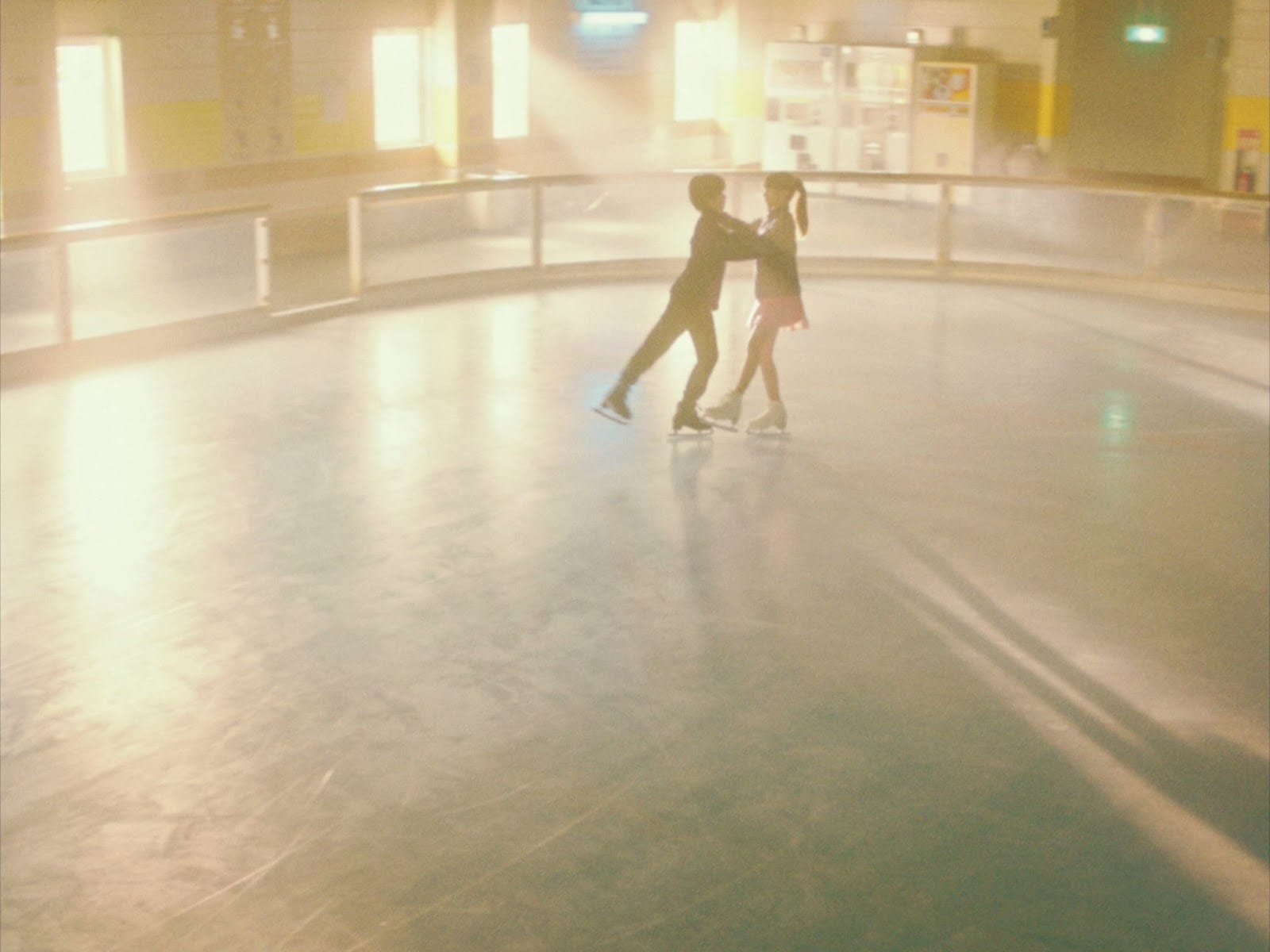
If Japanese cinema sometimes takes time to languish in the mundanity of daily life, this is a film that indulges in the unspoken. Literalizing this idea, Takuya speaks with a stutter that can often leave his feelings unanswered. Early in the film he tries to thank a friend, but his stutter means that by the time he can express his gratitude, that person has long since left.
Okuyama served as cinematographer for the film as well as director (while also writing the script), basing much of the experience on his own childhood learning to skate. This nostalgic lens continues into the film’s appearance, cropped to 4:3 with a warm haziness that turns the light beaming through the windows of the skating rink into blooming rays on sunshine, the silence doubling as a warm reminder of adolescence and self-discovery as much as it is a wordless conversation. The simple soundtrack by Ryosei Sato has a childish, innocent quality, while "Clair de lune’s" repeated usage marks peaceful tranquility in the moments it appears.
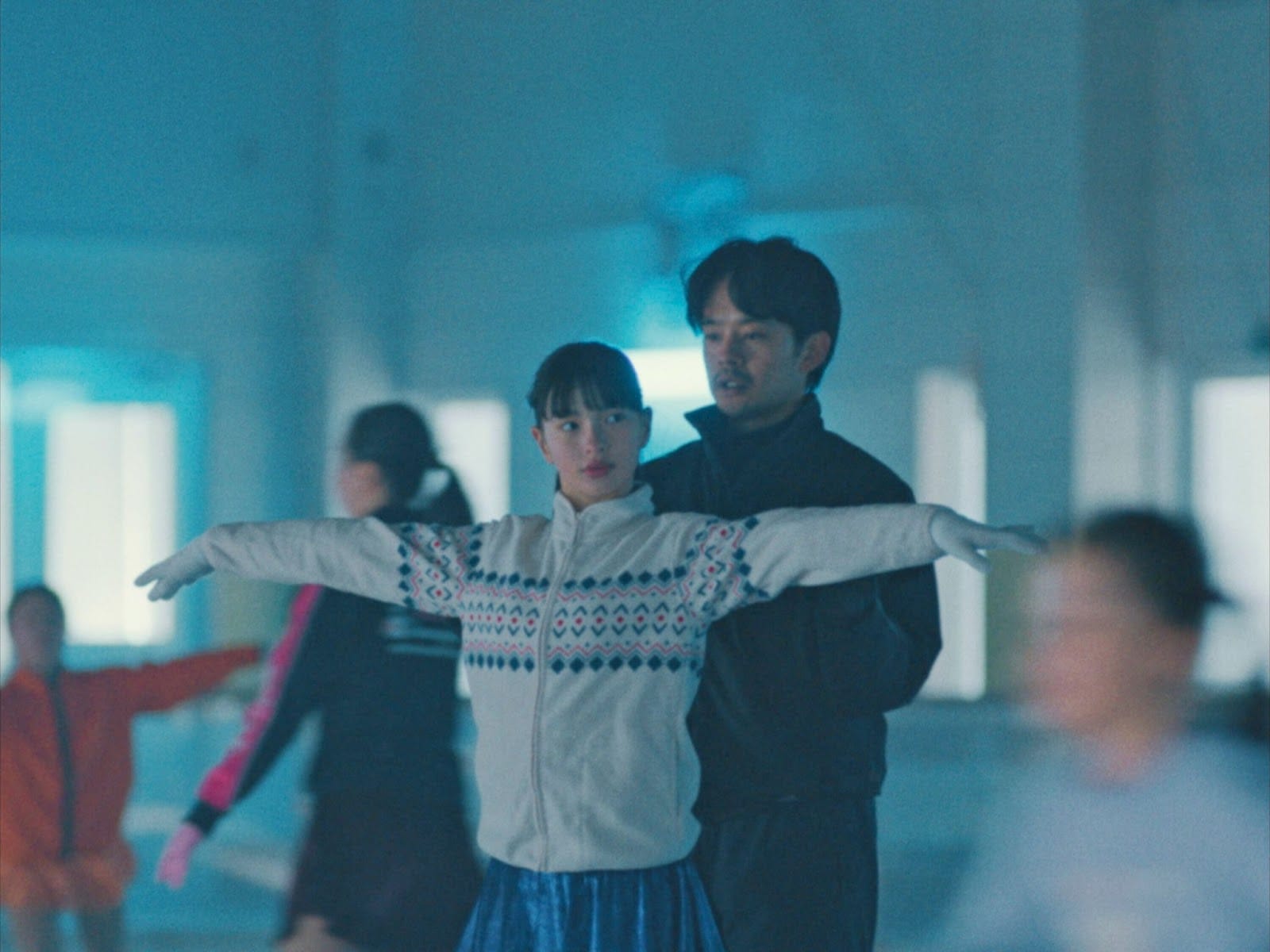
All this lulls you into a warm sense of security as you innocently observe their gradual coalescence. Sakura’s respect for Arakawa as a former champion sees her on-board with the suggestion of supporting novice Takuya in forming a duo for an upcoming competition. They train with clear passion, three hearts becoming one, even taking a ride to skate on the frozen lakes for the sheer joy of the sport, an aching moment that we hope will never end.
But just as the snow falls, it must inevitably melt. This is 2000s Japan, and there’s a tension at play in the way that gender and society constrict the lives of our characters that turns this seemingly-idyllic slice of life into something more ominous. In granting Takuya his former skates, Arakawa becomes a father figure to a child whose youthful intrigue reminds him of himself. Takuya’s difficulties in expressing himself contrasted with his joy and fascination in his new passion for skating to the point of practicing in his bathroom and every spare moment liberated from masculine expectation often does more to express himself than he ever can with words.
Yet skating’s association as a feminine sport is noted, and hovers over their participation throughout.
This is emphasized by Arakawa himself. While happy to train new skaters and mentor Takuya, behind closed doors he holds a secret. Only hinted at first, we watch him resting at home when a second figure enters the frame. As we return to the privacy of his home throughout the film, he’s always there. Then we notice their single bed frame. Then they share a cigarette and embrace on their balcony. Arakawa is gay, and his relationship with his live-in partner is kept secret. Until Sakura happens to see the pair leaving a supermarket.
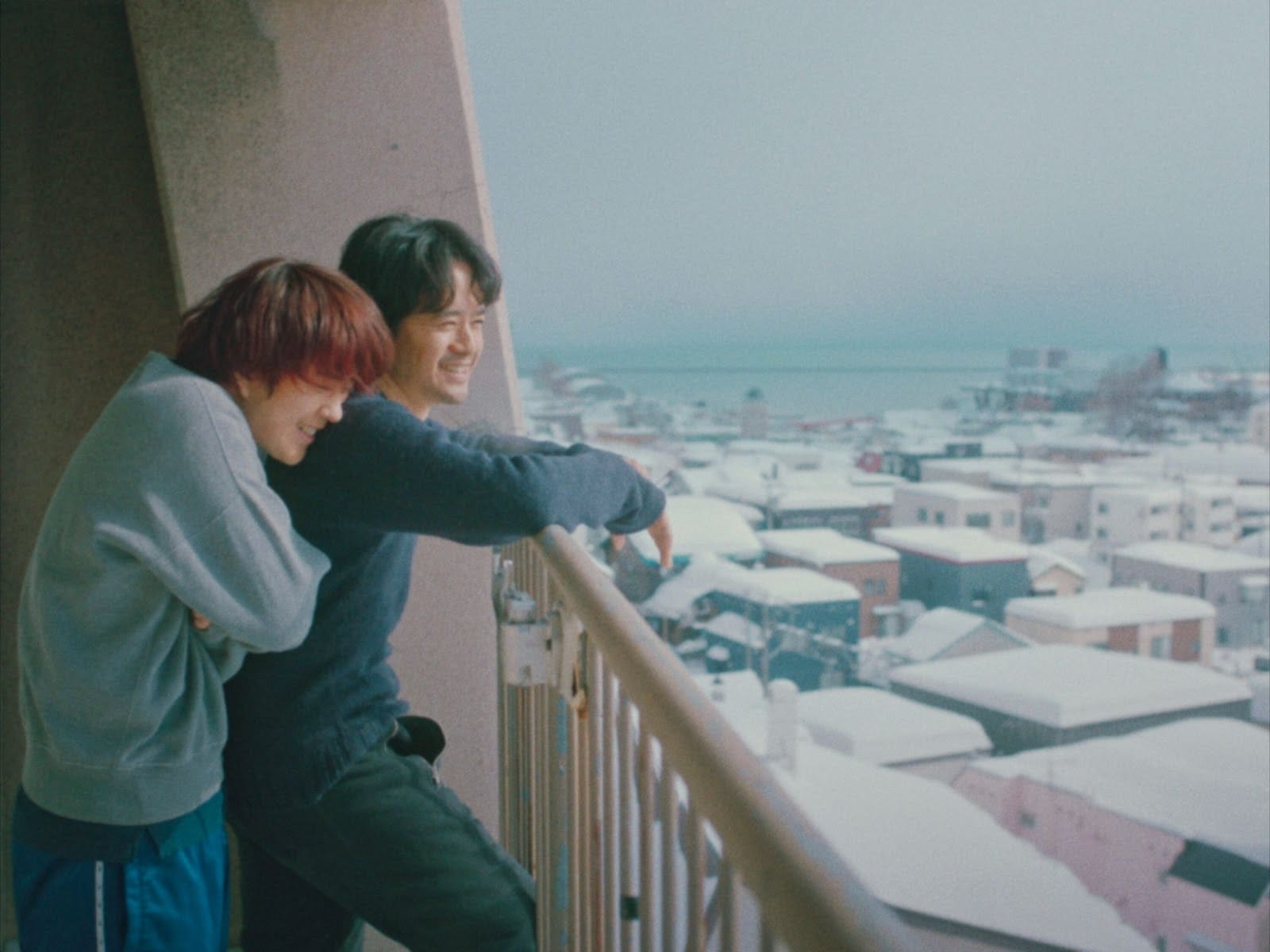
Suddenly that warm nostalgia is weaponized against us. The 4:3 framing suddenly feels claustrophobic, the warm hues of color and hazy rays of light transform from nostalgic to harsh and overbearing. Indeed, the mere concept of nostalgia is replaced with an overbearing pain, a sad cry on what could have been. Observations over these events leave us powerless to intervene as witness their shared hopes for a future dashed, this idyllic bond between three people falling apart in real time.
Just as words seem enough or unable to break free, a single utterance is all that’s needed to solidify their fate.
No one wins. Such societal expectations even now prevent us from our truth. While I hadn’t expected such a shift in tone, and indeed was uncertain of my feelings for the seemingly-sudden direction the film took in its second half - marketing for the film does nothing to suggest the film would be grappling such conversations - I can’t help but admire the decision to take the film in such a direction. It’s challenging in a way that sets it apart from its contemporaries. For all it shocks the system at the moment, it emboldens the film to be more than a warm embrace, to truly challenge the audience in a way Japanese cinema often fails to do. For such a new voice, it’s exciting that they’re willing to take these risks.
This film is one of four being released by up-and-coming directors over September and October, and a new book coinciding with this collection of releases interviews these creators and their staff to discuss their new perspectives on the medium as they each seek to set a new standard for domestic cinema. Okuyama is certainly living up to these ambitions, twisting convention and forcing his audience to become active observers and react accordingly when many films refuse to do so.
As the snow melts and the flowers bloom, baseball returns. Life moves on, but the pain and joy of youth live on as formative memories, the lessons learned sticking long into adulthood. As the credits roll, it asks but one question: what will you learn from the actions and mistakes of the past?
Japanese Movie Spotlight is a monthly column highlighting new Japanese cinema releases. You can check out the full archive of the column over on Letterboxd.

